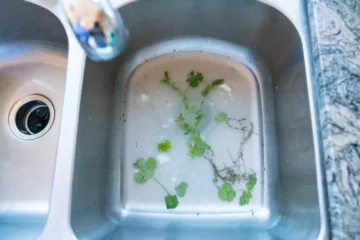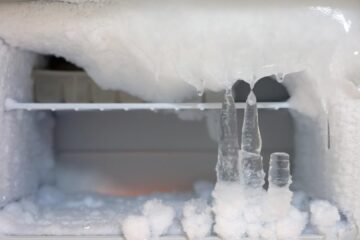
Ever give the appliances you use nearly every day a second thought? Sure, you notice if they don’t work or smell really bad. But if you clean them regularly to remove bacteria and grime that slows performance, these expensive workhorses can work better and last longer.
Clean Your Refrigerator Every 3 Months
Make refrigerator cleaning easier by wiping up spills when they happen and wiping down handles and dispenser controls daily with a disinfecting wipe to remove bacteria from lots of hands.1 Once a week, take a few minutes to check for food that needs to be tossed to prevent the growth of mold and mildew that spreads quickly.
Empty the fridge completely of food, shelves, and bins every three months for a thorough cleaning. Dispose of anything that is past its prime. Mix a solution of one teaspoon liquid dishwashing soap and one-quart warm water. Use a clean sponge or microfiber cloth to wipe down the interior, paying extra attention to any spills. Then wipe down surfaces with a clean dry cloth.
Wash the shelves and bins with the same detergent and hot water solution. Rinse well and dry completely before putting them back in the refrigerator. Along with the food, add a new, opened box of baking soda to help absorb odors and you’re done.
If you have a self-defrosting freezer compartment, follow the same cleaning steps. For a frost-filled freezer, follow the manufacturer’s recommendations for defrosting and cleaning.
Now that the inside is clean, unplug the refrigerator, pull it away from the wall, and vacuum behind and underneath. You may need to remove a vented cover to reach every crevice. If the coils and fans are coated with dust, the refrigerator must work harder to keep things cool.
:max_bytes(150000):strip_icc():format(webp)/best-homemade-stainless-steel-cleaner-1387939-04-dbb31563d8a84094a3f825e4b557a384.jpg)
Clean the Dishwasher Once a Month
Clean your dishwasher with vinegar and baking soda once a month to keep it working well. With an empty dishwasher, remove the bottom rack and check the drain strainer and detergent dispenser for any debris. Clean the strainer with a soft-bristled brush and replace the rack. Fill a glass bowl with one cup of distilled white vinegar and put it on the top rack. Run a hot water wash cycle but skip the drying cycle. Open the dishwasher and sprinkle in one cup of baking soda along the dishwasher floor. Run another short, hot water cycle.
Your dishwasher interior is now free of grease and odors and good to go for another month. At least once a year or if your dishwasher isn’t cleaning well, take the time to do a more thorough cleaning.
:max_bytes(150000):strip_icc():format(webp)/best-homemade-stainless-steel-cleaner-1387939_02_0238-8771286672354e56a66e431cbfb10acb.jpg)
Give the Garbage Disposal a Weekly Cleaning
Even with all that water flowing through a garbage disposal, it still needs a weekly cleaning to keep odors at bay. While grinding up a few citrus peels can add a nice fragrance, they don’t really do a good cleaning job, but there is a quick way to clean the disposal:
With the disposal turned off, create a cleaning foam by pouring in 1/2 cup baking soda and then slowly adding 1/2 cup distilled white vinegar. The combination will foam up to reach every crevice. Use the sink stopper to trap the foam inside. When the fizzing stops, flush with hot water. If you have a double sink, do both drains at the same time for the best results.
:max_bytes(150000):strip_icc():format(webp)/cleaning-a-garbage-disposal-2718863-17-d43ed442559548e9ba38c1d90a297bf6.jpg)
Clean a Cooktop and Oven Seasonally
Just like the refrigerator, you won’t have to do heavy-duty cleaning often if you wipe up spills and splatters immediately. Both smooth cooktops and those with burners can be cleaned with mild dishwashing soap and a hot water solution. Never use harsh cleaners or metal scrubbers that can mar the finish. A plastic spatula works best to remove hardened food.
If the cooktop has metal drip pans or grids over gas burners, they can stand up to a heavy scrubbing and should be cleaned monthly. You’ll get the best results if you allow the drip pans to soak in a solution of degreaser and hot water for about 30 minutes before scrubbing with a stiff-bristled scrub brush and a paste of baking soda and water if needed.
Ovens should be cleaned seasonally. The best time to clean is after a big holiday cooking marathon, not before! If the oven is self-cleaning, follow the manufacturer’s directions. For regular ovens that aren’t very dirty, use a paste of baking soda and water as a mild abrasive and grease remover. For baked-on messes, rely on a commercial oven cleaner and follow the directions.
:max_bytes(150000):strip_icc():format(webp)/ph-levels-for-common-cleaning-supplies-1900473-04-74394d65dbfb44028a916963b08268f5.jpg)
Easy Weekly Microwave Cleaning
Microwaves are so easy to clean, you should do it weekly to prevent a huge job later. Simply fill a microwaveable bowl with one cup of water. You can add some lemon slices if the microwave has strong odors. Turn on the microwave and bring the water to a boil; then let it sit inside for at least five more minutes. Open the door and use a dampened cloth to wipe down every surface. Turntables can go in the dishwasher or simply be wiped down. Be sure to clean the handle and touchpad with a disinfectant wipe to kill bacteria and germs.
If you have a combination microwave and vent hood mounted over your stove, don’t forget to give the vent filter a regular cleaning.
Monthly Routine for a Clean Washer
How can you expect to have really clean clothes if your washer is dirty? Front load washers often have a problem with musty odors and even top load washers should be cleaned monthly to remove detergent residue that traps soil and bacteria. Fortunately, it’s a simple job. Add one-quart chlorine bleach to an empty washer and run a hot water wash cycle with an extra rinse cycle.
Clean the Dryer Filter After Every Load
Since dryers don’t use water, the key to keeping them running their best is to empty the lint filter after EVERY load of laundry. If you use dryer sheets or liquid fabric softeners, clean the moisture sensor inside the dryer drum with a bit of isopropyl alcohol, monthly. Fabric softener and dryer sheets can leave a film on the sensor that disrupts drying times.


